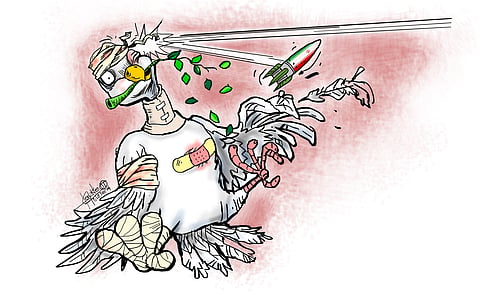
- NEWS
- the EDIT
- COMMENTARY
- BUSINESS
- LIFE
- SHOW
- ACTION
- GLOBAL GOALS
- SNAPS
- DYARYO TIRADA
- MORE

The Middle East, a region long marked by instability and conflict, is once again at the brink of a potential all-out war. Iran’s recent missile attack on Israel has escalated tensions in the volatile region, triggering fears of a broader conflict that could draw in multiple nations.
Known for its robust military capabilities and resolute national defense, Israel has vowed to retaliate against the assault. Adding another layer to this geopolitical tinderbox is the United States, which has expressed its unequivocal support for Israel, further heightening the stakes in this already precarious situation.
As the world watches this conflict unfold, one critical question emerges: Will peace in the Middle East remain elusive?
To fully understand the gravity of the situation, it is important to recognize the deep-seated animosity between Iran and Israel. This rivalry stems from geopolitical, ideological and religious differences that have spanned decades.
Iran, predominantly a Shiite Muslim nation, views Israel as an illegitimate state and a key adversary in the region, often expressing solidarity with the Palestinian cause.
Israel, in turn, perceives Iran’s ambitions and military developments — particularly its nuclear program — as existential threats. The two nations have frequently engaged in proxy battles, with Iran supporting militant groups like Hezbollah and Hamas that target Israel. The missile attack, therefore, is not an isolated incident but part of a broader pattern of hostility.
Israel’s response to Iran’s missile attack is likely to be swift and decisive. Historically, Israel has never shied away from retaliating against threats to its security and its military prowess is well-documented.
From airstrikes on Iranian-backed militias in Syria to cyber-attacks on Iranian infrastructure, Israel has consistently sought to neutralize threats emanating from Tehran. The country’s vow to retaliate against this latest missile strike suggests that an escalation of military action is imminent.
However, this retaliation could potentially spiral into a wider conflict. Iran, emboldened by its alliances with groups like Hezbollah in Lebanon and militias in Iraq, may mobilize these forces against Israel, thereby opening multiple fronts in the conflict.
The resulting clashes could draw in other regional powers, such as Saudi Arabia, which views Iran as a rival and has its own vested interest in the outcome of any conflict involving Tehran. The United States’ involvement further complicates matters, as it not only supports Israel but also has a fraught history with Iran, particularly in the context of sanctions and the Iran nuclear deal.
The United States’ support for Israel has always been a cornerstone of its Middle East policy. With its recent declaration of backing Israel in the wake of Iran’s missile attack, the US is signaling its readiness to defend its key ally in the region.
However, this support may come at a cost. American military involvement, whether direct or indirect, could further destabilize the region and strain relations with other nations.
Russia, for instance, which has close ties with Iran, could view US support for Israel as a provocative move, potentially igniting tensions between global powers. Additionally, the US risks alienating Arab nations, some of whom have recently normalized relations with Israel but remain wary of excessive US intervention in regional affairs.
Given the complex web of alliances, historical enmities, and religious divides, peace in the Middle East has always seemed elusive. The ongoing conflict between Israel and Iran is but one of many flashpoints in a region marked by civil wars, insurgencies, and external interventions. The Arab-Israeli conflict, the Syrian civil war, the Yemen crisis and the rise of militant groups like ISIS have all contributed to the region’s instability.
Moreover, diplomacy has often fallen short of achieving lasting peace. Efforts such as the Iran nuclear deal, the Abraham Accords, and various US-led peace initiatives have provided brief glimmers of hope but have failed to address the underlying issues fueling conflict.
Iran’s missile attack on Israel, and the subsequent vow of retaliation, reflects the deep mistrust and zero-sum nature of Middle Eastern geopolitics. As long as regional powers continue to vie for dominance, and as long as ideological and religious divisions remain deeply entrenched, peace will remain an elusive dream.
